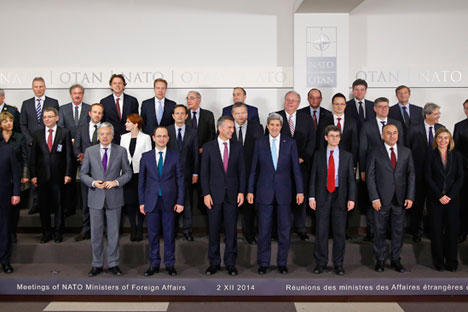
NATO foreign ministers and U.S. Secretary of State John Kerry (5th R) attend a meeting at the Alliance's headquarters in Brussels December 2, 2014. Source: Reuters/Yves Herman
Reporting on the meeting of NATO foreign ministers in Brussels on Dec. 2, Nezavisimaya Gazeta newspaper writes that, despite all the intensity of the Ukrainian conflict, the majority of the NATO’s foreign ministry representatives exclude the possibility of a new Cold War.
However, Poland and the Baltic countries have again demonstrated their preoccupation with Russia's behavior in the conflict. They are afraid that the tactics that Moscow is using in Ukraine could also be used against them. Therefore NATO's brainstorming was aimed at producing effective measures that can be used to counter Russia's tactics.
Appearing before journalists immediately after the meeting, NATO Secretary General Jens Stoltenberg announced that Ukraine is abandoning its non-aligned status and can therefore become a NATO member. "Earlier Ukraine officially adhered to the non-alignment position," said Stoltenberg. "Now the government has announced that Ukraine will no longer have this status, and we respect this decision."
The alliance will increase the number of its advisors in Kiev and will add a fifth trust fund to the four already announced. The resources, provided by Bulgaria and Slovakia, will be used to rehabilitate wounded Ukrainian soldiers. Nezavisimaya Gazeta is aware of the existence of secret agreements on the Ukrainian army's highly intensive adaptation of NATO standards.
The Kommersant newspaper has been following the formation of the government in Ukraine. The main distinguishing factor of the new cabinet of ministers is the unprecedented inclusion of foreigners, notes the publication. According to Kommersant, the candidates were selected by headhunting firms, whose services were paid for by one of billionaire financier George Soros's funds.
In the end, Ukrainian President Petro Poroshenko approved only three candidates: The Finance Ministry was given to U.S.-born Natalie Jaresko, Georgian Alexander Kvitashvili received the Health Ministry and the Lithuanian-born Aivaras Abromavicius obtained the Ministry of Economic Development and Trade. Poroshenko made all three ministers Ukrainian citizens in an accelerated procedure (it normally takes about five years).
"By inviting foreigners into the government, the authorities wish to show the population that they are committed to serious reforms," writes Kiev political analyst Dmitry Dzhangirov. "But the problem is that a foreign citizen will not be able to quickly fit into the Ukrainian official apparatus." Dzhangirov believes that it is unlikely that the ministries will be able to function properly while the foreign officials are adapting.
The Moskovsky Komsomolets newspaper reports on the reasons that forced the Russian government to abandon the construction of the South Stream gas pipeline linking Russia and Central Europe via the Black Sea.
"Why are European officials so up in arms about South Stream?" writes the newspaper. "Because by 2018, when the gas pipeline would have been fully functional, South Stream would have bypassed Ukraine, through whose territory half of Russia's gas to Europe now transits."
Experts believe that abandoning South Stream is a diplomatic fiasco for Putin. Gazprom has already spent 400 billion rubles (about $8 billion) on the project and Russian factories have begun producing pipes and parts, expecting to make about 1.8 billion euros ($2.2 billion). And most importantly, South Stream would have supplied 63 billion cubic meters of gas a year, which represents more than $25 billion in annual revenue.
All rights reserved by Rossiyskaya Gazeta.
Subscribe
to our newsletter!
Get the week's best stories straight to your inbox